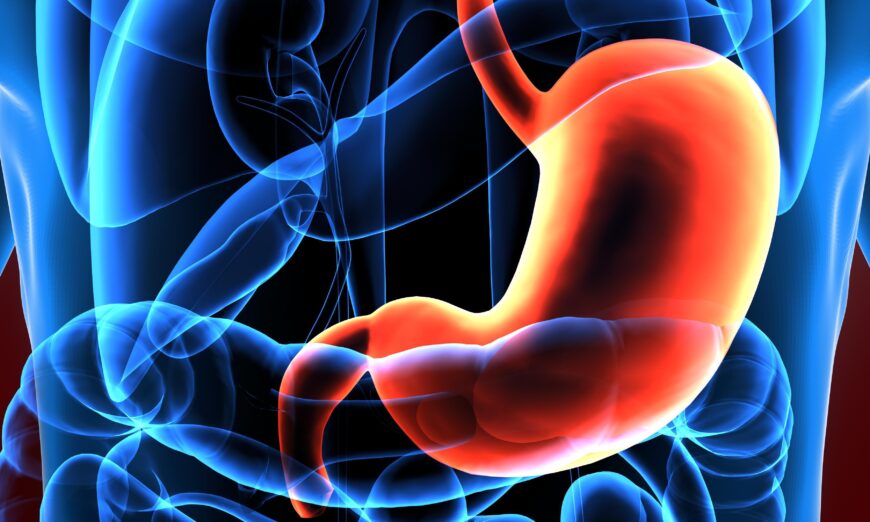
Silent reflux is a condition that often hides in plain sight. If you have a chronic cough, frequent throat clearing, or often have a sore throat, you may have silent reflux.
Reflux means your stomach contents come back up into your throat, which for many people causes heartburn. In silent reflux, heartburn may not happen, leaving you unaware that there is a problem. But this doesn’t mean that your throat and voice aren’t being damaged.
In this article, we’ll define silent reflux and its related conditions, GERD and LPR, describe what can cause silent reflux, and share the research-backed strategies to improve silent reflux and heartburn.

What Are Silent Reflux, LPR, Acid Reflux, and GERD?
Reflux is when contents of the stomach regurgitate into the esophagus or throat. There are several terms used for closely related reflux conditions:
- Silent reflux primarily affects the voice box and the back of the throat or sinuses. It’s called silent reflux when the burning pain associated with acid reflux and heartburn isn’t present.
- LPR (laryngopharyngeal reflux) is simply the medical term for silent reflux. “Laryngo” means something that affects the larynx or voice box, and “pharyngeal” means something that affects the area at the back of the throat, called the pharynx.
- Acid refluxis similar to silent reflux, but the defining symptom is burning pain in the throat or heartburn.
- GERD (gastroesophageal reflux disease) is a more advanced dysfunction of the esophagus caused by prolonged damage to the throat from untreated reflux.
Silent Reflux Symptoms
Silent reflux symptoms primarily affect the voice box (larynx), back of the throat, and sinuses. If you have many of the following symptoms, you may want to be evaluated for silent reflux [1]:
- Hoarseness or vocal cord inflammation
- Chronic cough or frequent bronchitis
- Regurgitation
- Sore throat
- Throat clearing or tickling in the throat
- Difficulty swallowing
- The feeling of a lump in the back of the throat
- Heartburn
- Postnasal drip
- Sleep disturbance
- Shortness of breath
Untreated, silent reflux can lead to the more serious symptoms or conditions of GERD, which include:
- Chronic vocal injury or scarring of the vocal folds
- Barrett’s esophagus (changes in the skin lining your esophagus), which can lead to a rare esophageal cancer [2]
- Narrowing of the airway just below the vocal cords [3]
- Eosinophilic esophagitis [4]
Silent reflux is usually diagnosed by a gastroenterologist or ear, nose, and throat doctor (otolaryngologist). Diagnosis may be based on medical history or an endoscopy (a test to look at your esophagus and stomach). You can’t see reflux on an x-ray.
If you are having difficulty swallowing, feel a sensation of a lump in your throat, or experience frequent vomiting, please get evaluated by your doctor to rule out anything serious.

What Causes Silent Reflux?
The causes of silent reflux are unique for each person, and there’s not a universally agreed-on cause. But similar to other digestive problems, it can relate to changes like:
- Slowing of your gut motility (the movement of food through your gut) [1];
- Low digestive juices, like stomach acid or digestive enzymes;
- Or poorly functioning sphincters (muscles in your digestive tract that open and close to allow food through). This may allow the contents of your stomach to backflow into your esophagus [1].
For example, a lazy lower esophageal sphincter is often a cause of reflux.
And though there aren’t clear causes, you’re more likely to have silent reflux if you also have these conditions:
- Sleep apnea: A systematic review found that 45% of people with sleep apnea also had LPR [1].
- Hiatal hernia: Occurring when the upper part of your stomach bulges through your diaphragm, this is associated with reflux for about 53% of patients [1].
- Low stomach acid: This is often caused by increased age [5], some autoimmune diseases, or long-term PPI use [6].
How to Address Silent Reflux
If you have silent reflux, it’s important to get treatment to prevent long-term damage to your esophagus and throat.
Conventional treatment for silent reflux usually involves proton pump inhibitors (PPIs) like omeprazole (Prilosec), but many reflux patients don’t experience relief on these medications. Even worse, long-term PPI use is associated with an increase in all-cause mortality [1], cardiovascular problems, and GI infections [7].
A natural approach can often improve or resolve silent reflux and has fewer risks. Let’s explore what can help.
A Natural Approach for Silent Reflux
Reflux can respond well to some diet and lifestyle changes. In simple terms, a natural strategy for silent reflux includes the following steps:
- Modify your diet and eating habits to remove reflux triggers.
- Improve your gut microbiome with probiotics. Address gut infections with antimicrobials if necessary.
- Support your stomach acid with betaine HCL if needed.
- Add additional therapies only if the first three don’t provide relief.

Let’s explore the specifics of this approach.
Diet Advice for Silent Reflux
Certain foods and eating behaviors, like overeating, often aggravate reflux and heartburn.
If you haven’t yet figured out what is making your reflux worse, a simple elimination diet to remove common inflammatory foods is a good place to start. Studies suggest a low-carb diet or a low FODMAP diet may be helpful for GERD, reflux, and heartburn [8, 9, 10]. A low-carb Paleo diet or low FODMAP diet is a great place to start.
Other diet advice that has been shown to be helpful for reflux, GERD, or heartburn is aimed at reducing common symptom triggers. This includes [1]:
- Avoiding oily, acidic, fried, or spicy foods
- Avoiding caffeine and alcohol
- Eating smaller meals to avoid overeating
- Not lying down for several hours after eating [11]
- Elevating the head of your bed several inches by placing blocks under the bed’s top legs.
Ultimately, test any dietary changes for a few weeks. If they don’t make any difference, there’s no need to continue. If they are helping, continue avoiding the foods and behaviors that were triggering your symptoms while you work on other areas.
The Gut Microbiome and Silent Reflux
Some early research suggests that the health of your gut microbiome may be related to reflux. For example, a systematic review found that probiotics appeared to improve several GERD symptoms, including regurgitation, reflux, heartburn, and indigestion [12].
Another systematic review and meta-analysis found that H. pylori, a bacterial infection of the stomach known to cause ulcers,was prevalent in almost half of patients with LPR [1]. This implies that there is an association between H. pylori infection and some LPR cases. On the other hand, H. pylori has been shown to protect against reflux and esophageal cancer in other studies, so the data don’t all agree [1].
In the absence of clear clinical research, we can tentatively infer that improving the gut microbiome with triple probiotic therapy and treating any underlying infections like H. pylori or SIBO may provide reflux relief.

Stomach Acid for Silent Reflux
PPIs like esomeprazole (Nexium), lansoprazole (Prevacid), or H2 blockers (antihistamines like Pepcid AC) are often prescribed for silent reflux to reduce stomach acid.
However, not all evidence agrees that PPIs improve reflux. For example, two systematic reviews and meta-analyses suggest that PPIs improve reflux [13, 14], while a different systematic review found there was no statistical difference for patients between PPIs and a placebo [1].
Ironically, increasing stomach acid improves reflux for some patients. Stomach acid supports many aspects of your digestive function, and a deficiency can contribute to many gut symptoms. Not everyone needs stomach acid, but we’ve seen it make a big difference for some patients at our center for functional medicine. If supplemental stomach acid is right for you, it should lead to noticeable changes in your symptoms. If it doesn’t, supplementation should be discontinued.
You may be more likely to benefit from stomach acid support if you:
- Are over 65 [5]
- Have an autoimmune condition, like Hashimoto’s thyroiditis or rheumatoid arthritis
- Are anemic [15]
- Have been diagnosed with H. pylori
- Have chronically used antacids or proton pump inhibitors (PPIs)
Additional Therapies for Silent Reflux
A few other natural remedies may provide added relief from silent reflux symptoms. Consider bringing these therapies into your routine if diet changes, probiotics, and stomach acid support haven’t made a difference.
- Sodium alginate, a supplement derived from brown kelp, forms a foam raft that acts as a physical barrier between the esophagus and stomach. A systematic review found alginate therapy highly effective for mild GERD [16]. Alginate is the active ingredient in a liquid over-the-counter medication available in the UK called Gaviscon Advance and a relatively new product called Reflux Gourmet.
- Melatonin, a hormone your body produces each night to stimulate sleep, may protect the esophagus for people with GERD and heartburn [17]. Studies suggest melatonin may be as effective as a PPI for improving GERD [18, 19].
- Prokinetic herbs, like Iberogast or RKT (a Japanese herbal blend), improve the movement of food through your digestive tract and may improve reflux, heartburn, and lower esophageal sphincter function [16, 20, 21, 22, 23, 24, 25].
Surgical Treatment for Silent Reflux and Hiatal Hernia
Hiatal hernia — when the upper part of your stomach bulges through a tear in your diaphragm (the muscle at the bottom of your rib cage that drives your breathing) — is associated with reflux in about 53% of cases [1].
One study compared a surgical treatment called fundoplication to PPI therapy alone for patients with LPR and hiatal hernia. Fundoplication was found to be more effective for improving cough, throat clearing, and improved quality of life for patients with LPR [26]. Most patients who were treated surgically were able to discontinue PPI therapy.
In addition, some chiropractors and osteopaths are skilled at adjusting a hiatal hernia, which may give some temporary relief of hiatal hernia-related reflux symptoms.
The Bottom Line
If you have chronic symptoms like a frequent cough, throat clearing, or a sore throat, silent reflux may be the reason for your symptoms.
Instead of taking prescription medications that may have serious side effects, focus on root cause solutions like removing your food triggers, rebalancing your gut microbiome, and supporting stomach acid first. Consider additional therapies if these strategies don’t work to prevent damage to your esophagus.
With some dedicated attention to these details, you can improve silent reflux and protect the long-term health of your voice and throat.